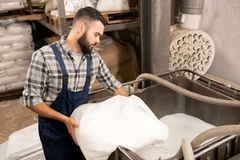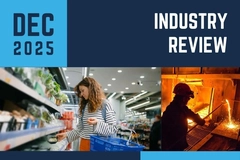European Bioplastics conference 2024 live: Head of EU Affairs highlights progress and challenges
The success of bioplastics hinges on multi-stakeholder collaboration, including cross-industry partnerships, Roberto Ferrigno, head of EU Affairs at European Bioplastics, tells us as the European Bioplastics Conference 2024 (EBC24), which begins today in Berlin, Germany.
The EBC24 is a two-day event dedicated to bio-based, biodegradable and compostable plastics. It brings together industry stakeholders, researchers, policymakers and environmental advocates to discuss advancements and challenges in the field.
Ahead of this year’s conference, Ferrigno expects to gain insights into emerging technologies.
“I anticipate gaining an understanding of the latest innovations in bio-based and biodegradable materials, such as new polymer blends and advanced production processes,” he tells Packaging Insights.
“There will likely be discussions on evolving EU regulations, including the upcoming European Bioeconomy Strategy, Biotech and Biomanufacturing Act, the Circular Economy Act and their implications for bioplastics, as well as market trends.”
Meanwhile, Ferrigno is also expecting to explore real-world case studies on how bioplastics can contribute to achieving circular economy goals.
“The conference highlights advancements in raw material sourcing, production technologies, market trends, regulatory frameworks and sustainability assessments.”
“It serves as a hub for fostering partnerships and facilitating knowledge exchange, promoting the adoption of bioplastics as part of the EU Bioeconomy and Clean Industry Deal, and the global sustainability agenda.”
Establishing a European bioplastics economy
.jpg) Europe faces competition from North America and Asia-Pacific where production costs are lower and market growth is faster .Ferrigno identifies next-generation polymers derived from renewable sources as an emerging alternative to petrochemical polymers.
Europe faces competition from North America and Asia-Pacific where production costs are lower and market growth is faster .Ferrigno identifies next-generation polymers derived from renewable sources as an emerging alternative to petrochemical polymers.
“Enhanced compostable plastics have also been emerging. There are advances in materials that perform well in diverse environmental conditions while remaining industrially or home-compostable.”
Upcycling technologies and smart packaging solutions are further innovation areas, according to Ferrigno.
He says that to establish a European bioplastics economy, the following is needed:
- Infrastructure investment: Development of widespread composting and recycling facilities tailored to bioplastics.
- Harmonized legislation: Establishing clear and consistent regulations across EU member states to encourage investment and innovation.
- Market incentives: Providing subsidies or tax benefits for companies adopting bio-based materials and creating demand through public procurement policies.
- Consumer awareness: Educating the public about the benefits and proper disposal of bioplastics.
Unlocking new possibilities
Europe’s bioplastics economy is advanced in R&D, policy frameworks and sustainability commitments, according to European Bioplastics data.
“The EU’s emphasis on circular economy principles provides a robust foundation for bioplastics growth,” says Ferrigno.
But Europe faces stiff competition from regions like North America and Asia-Pacific, where production costs are lower and market growth is faster due to less stringent regulations.
“Europe’s focus on innovation and high-quality standards could allow it to differentiate itself and lead in specialized applications, such as medical or high-performance bioplastics,” continues Ferrigno.
He says that besides collaborative efforts, research funding is needed for greater allocation of public and private funds toward bioplastics R&D to unlock new possibilities.
“Furthermore, addressing the full lifecycle of bioplastics, from sourcing to end-of-life, will be critical to achieving environmental and economic benefits.”











